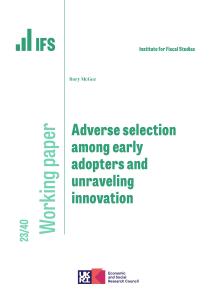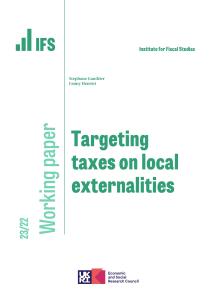Sharp nonparametric bounds are derived for counterfactual demands and Hicksian compensating and equivalent variations. These "i-bounds" refine and extend earlier results of Blundell, Browning, and Crawford (2008). We show that their bounds are sharp under the Weak Axiom of Revealed Preference (WARP) since they do not require transitivity. The new bounds are sharp under the Strong Axiom of Revealed Preference (SARP). By requiring transitivity they can be used to bound welfare measures. The new bounds on welfare measures are shown to be operationalized through algorithms that are easy to implement.
Authors

CPP Co-Director
Richard is Co-Director of the Centre for the Microeconomic Analysis of Public Policy (CPP) and Senior Research Fellow at IFS.

Research Associate University of Copenhagen
Martin is an IFS Research Associate, a Nuffield Senior Research Fellow and a Professor of Economics at the University of Oxford.

Ian Crawford

Research Associate Katholieke Universiteit Leuven
Laurens is a Research Associate of the IFS and a Professor in the Department of Economics, KU Leuven.

Research Associate Université libre de Bruxelles
Bram is a Research Associate of the IFS, a Professor of Economics at ULB and a Professor of Mathematics and Statistics at KU Leuven.

Research Associate University of Leuven
Frederic is a Research Associate of the IFS, a Professor of Economics at the University of Leuven and a Research Fellow at the CEPR.
Journal article details
- DOI
- 10.1257/mic.20130150
- Publisher
- American Economic Association
- JEL
- D04, D11
- Issue
- Volume 7, Issue 1, February 2015, pages 43-60
Suggested citation
Blundell, R et al. (2015). 'Sharp for SARP: nonparametric bounds on counterfactual demands' 7(1/2015), pp.43–60.
More from IFS
Understand this issue

What's wrong with inflation?
10 May 2023

Transparency is key to maintaining trust in government. Let’s not cap it
12 September 2022

How should the government tax electric cars?
19 May 2022
Policy analysis

Tax and public finances: the fundamentals
23 August 2023

Poverty
13 July 2023

Living standards, poverty and inequality in the UK: 2023
13 July 2023
Academic research

Saving by buying ahead: stockpiling in response to lump-sum payments
2 February 2024

Adverse selection among early adopters and unraveling innovation
18 December 2023

Targeting taxes on local externalities
14 August 2023